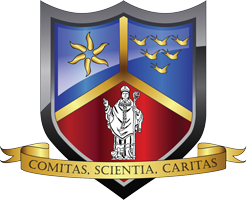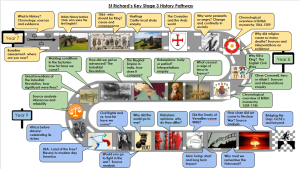History
Meet the Department
Mrs R Campbell – Subject Leader for History, PP and Extra-curricular Lead
Mr R Doherty – History Specialist, Assistant Principal & Pastoral Leader for Year 11, Intervention Coordinator for History
Mrs L Avery – History Specialist, More-Able Coordinator for History
Mrs S Fegan – History Specialist, Reducing the Gap Lead for History
Mrs N Campbell – Teaching Assistant for History/Geography
Intent
In History we aim to inspire pupils with a thirst for knowledge about the past and a love of learning, through both the curriculum and enrichment activities. We want to teach pupils the transferable skills to ask intelligent questions, evaluate sources critically, weigh evidence and make sustained judgements to prepare them for further education and future careers. The discipline should enable pupils to understand where they have come from and the challenges we face in our diverse society, including social, cultural and political. The department strives to develop a positive attitude in our pupils for not only learning but to become active citizens in the world today by being both intellectually and morally responsible for their own actions. We aim to create young people who are able to question, challenge and make judgements on the world around them and the many different sources of information that they interact with. They will be able to form and answer questions of their own to demonstrate their understanding of the historical topics and be able to refer to and make links between different historical periods. Their study of history at St Richard’s will provide them with important historical knowledge and chronological understanding through well planned and sequenced lessons that build on key skills and challenge appropriately. Literacy, oracy and numeracy are embedded throughout our curriculum as well as opportunities for learners to work independently and collaboratively and as a result pupils are motivated, happy and achieve their potential.
Implementation
Key Stage 3
The Key Stage 3 curriculum for History covers fascinating and diverse historical units that build on both chronological understanding and the skills required at GCSE level. Each unit is focused on an overarching enquiry question and is tailored to ensure all learning styles are fully catered for. Pupils’ knowledge and understanding are continually assessed throughout, culminating in an end of unit assessment which will focus exam questions that pupils will experience in KS4. The skills of source inferencing, identifying key features of a period, explaining why events happened and making an overall judgement on how far they agree with a historical statement, are the primary focus of KS3 assessment. Local, British and world history is featured in all years and our lessons are regularly adapted and amended to reflect the diversity within our society and our school and in response to pupil voice suggestions.
At the start of year 7 all pupils complete a baseline test which allows us to ascertain prior learning at KS2. Building on the knowledge we have of how History is taught at our main feeder schools, our year 7 units focus on the medieval and tudor periods, building in links to our local history by looking at the Battle of Hastings and Hasting Castle.
Our chronological curriculum enables pupils to gain a logical context of the subject in which historical concepts such as change and continuity and significance can be assessed throughout. The skills assessed at KS4 are also embedded at KS3 to develop pupils ability overtime to investigate enquiries, weigh up evidence, evaluate sources critically and make valid judgments
As well as historical concepts and skills, terminology taught at KS3 is also taught so that it can be recalled as pupils progress up the school e.g. an understanding of social, political and economic factors is developed, as well as historic vocabulary such as feudalism, empire and communism.
Each school year has a political theme encouraging awareness of political change and the socio-economic make-up of society. The curriculum is made relevant to today with links drawn in all topics for example; linking the history of slavery and civil rights in Year 9 to racism in America today such as Trump’s comments on Charlottesville, or examining the role of Parliament today when teaching the English Civil War to Year 8.
Key Stage 4
At Key Stage 4 appealability is an important factor and as a result the department offers a range of subjects that creates breadth for our pupils including; The American West, Medicine in Britain and the historic environment of the western front, Weimar and Nazi Germany and Anglo-Saxon and Norman England or Elizabethan England. Pupil voice and the number of pupils who opt for History at GCSE level are good indicators that our chosen topics of study are accurate and meet the needs and wants of our pupils. Extra-curricular opportunities are also created by the study of these units including day trips to the Science Museum, the Old Operating Theatre, Hampton Court Palace, Pevensey Castle and Battle Abbey. The Weimar and Nazi Germany unit also enables the department to organise history trips to Germany so that pupils can visit a range of historical sites which have previously included guided tours of Sachsenhausen concentration camp, the Topography of Terror Museum and the Reichstag. Links to history beyond our GCSE syllabus are encouraged and pupils have also had the opportunity to visit cites from the Cold War era too, including the Stasi Museum and Stasi Prison.
In addition to the units the department has chosen to teach, all KS4 historians pupils are also given the option to choose between the Elizabethan or Anglo-Saxons unit. This links not only to teacher specialism within the department but pupil interest. Offering a wider range of units really gives pupils the opportunity to learn more about medieval or Renaissance history, foster and develop their natural interest and hopefully encourage the study of History thereafter at a higher level post GCSE.
The order of units at KS4 is reviewed each year to support pupil progress. Each unit has different question types and weighting therefore the department discusses how best to map the KS4 curriculum and alters as necessary. For example we have designed the curriculum to begin with a shorter unit first, either Anglo Saxon and Norman England or Elizabethan England (this choice is optional for pupils). This unit is worth 20% of the GCSE and consists of 3 question types. These question types have been a focus for KS3 assessments and therefore pupils feel confident as they begin their GCSE studies that they can attempt them. We conclude with Weimar and Nazi Germamy which is worth 30% of the GCSE and consists of 6 question types (including Interpretation analysis). Pupils historically find the Germany unit most challenging and thereby by teaching it last allows pupils to build on the skills they already have by the end of Year 11.
The department makes links to future career aspirations through different topics and transferable skills. This has consisted of displaying career focal points in the classroom, engaging in discussion with pupils and making clear why specific units have been chosen, explaining the purpose of our lessons and linking to topics and specific skill sets.
Impact
Engagement
Pupil engagement in the subject is evident through learning walks, pupils voice and the quality of work produced at KS3 and KS4. History classrooms and the wider school celebrate a love of the subject and the inquisitive nature of our pupils. Historians are able to understand the importance of the discipline in the world today, the relevance of transferable skills and the career opportunities that learning History offers. This is shown by the high uptake of pupils opting for History at KS4 for GCSE which also reflects on the engagement of pupils at KS3. This is continued at KS5 as many of our pupils opt for History at A-Level and links with subjects such as Law and Politics.
Enrichment
Pupils have shown themselves to be keen to take part in the extracurricular activities which the History department provides and this is evidenced by the successful running of history trips (pre lockdown).
The department also feels it is essential that all pupils experience history enrichment regardless of their KS4 options. Historical days are recognised and activities organised to remember events such as Black History Month and Remembrance Day for the whole school. Holocaust Memorial Day is commemorated by pupils across the school watching a live broadcast by a Holocaust survivor each January. Finally, History club runs once a week for all year groups with a pleasing number of pupils taking part.
Attainment and Achievement Outcomes
High levels of achievement in relation to aspirational targets of all pupils are a clear indicator that our curriculum is achieving our desired intent. The historical data of our department continues to demonstrate that all pupils are achieving highly and are significantly above national averages in History.
Year 7
How was Saxon England conquered? A unit focussed on the changing nature of Britain from the end of the Roman Empire to the rule of William the Conqueror.
Why were medieval peasants always angry? A unit focussed on the lives of peasants during the middle ages.
Why did religion cause so many deaths? A unit focussed on the religious changes during the Tudor period.
Year 8
Why kill a King? A unit focussed on the English Civil Wars, looking at causes, consequences and impact on the people of Britain.
What caused a reign of Terror in France? A unit focussed on the events of the French revolution.
How did we get so advanced? A unit focussed on the Industrial Revolution, charting the changes and impact on society.
Year 9
USA: land of the free? A unit charting the treatment of Black people in America spanning life before slavery and culminating in the Civil Rights Movement.
Why did the world go to war? A unit evaluating the long and short term causes of world war 1 and investigating the different theatres of war, 1914-1918.
How did conflict lead to persecution? A unit looking at the consequences of WW1 leading to the growth of Nazi Germany, World War 2 and the Holocaust.
How close did we come to Nuclear War? A unit that investigates the growth of superpowers and charts the key events of the Cold War.
2020 History Option Presentation
KS4 Topics Outline
The GCSE syllabus requires pupils to demonstrate their ability to recall, select and organise knowledge; to describe and explain events, changes and issues and to use a wide range of sources of information.
Year 9/10
Unit 1: Anglo Saxon and Norman England 1060-88, or Elizabethan England 1558-88
Unit 2: Medicine in Britain 1250-present day, and the British Sector of the Western Front
Year 11
Unit 1: The American West 1835-95
Unit 2: Weimar and Nazi Germany 1918-1939
We follow the Pearson Edexcel 2016 GCSE History specification. More information included recommended resources and past papers can be found via their website https://qualifications.pearson.com/en/qualifications/edexcel-gcses/history-2016.html
Exam Updates and Timetable
September 2022 Update:
For Summer 2023, the Department for Education confirms the return to full subject content coverage for GCSE History – all four topics must be taught and addressed.
This means that pupils will sit three exams:
Paper 1: Medicine in Britain and the Western Front
Paper 2: Elizabethan England and the American West
Paper 3: Weimar and Nazi Germany
GCSE History Results
2023: 4 and above 90%, 5 and above 83%, 7 and above 52%
2022: 4 and above 94%, 5 and above 85%, 7 and above 59%. Average point score 6.7.
2021: 4 and above 90%, 5 and above 80%, 7 and above 43%. Average point score 6.1.
2020: 4 and above 92%, 5 and above 80%, 7 and above 50%. Average point score 6.3.
2019: 4 and above 84%, 5 and above 68%, 7 and above 36%. Average point score 5.7.
2018: 4 and above 83%, 5 and above 74%, 7 and above 44%. Average Point Score 5.9
2017: 88% A*-C, 39% A*-A
2016: 88% A*-C, 45%A*-A
2015: 80% A*-C, 42%A*-A
2014: 81% A*-C, 37% A*-A
2013: 91% A*-C, 48% A*-A
2012: 78% A*-C, 37% A*-A
Delivery and Assessment
In KS3, all pupils are set an aspirational target level that is based on their KS2 average point score and other relevant data. At KS4, pupils are set an aspirational target grade based on Fischer Family Trust and our own internal assessment data. Pupils are expected to achieve this grade and will be supported to do so.
Work is marked using WWW (what went well) and EBI (even better if) comments and scores are applied in relation to extended, exam style questions. Past paper questions are marked according to exam board mark schemes.
History is taught with the aim to address all learning styles and preferences. Within that learners complete a varied selection of tasks, including project and group work, independent research and pupil presentations.
At Key Stage 3 pupils are assessed at the end of each unit. Assessment questions reflect the question types given on GCSE papers to help prepare pupils at all levels for the terminal exams in Year 11.
At GCSE pupils are assessed through three written exams at the end of Year 11:
Paper 1: Thematic Study with Historic Environment Medicine and the British Sector of the Western Front: 52 marks, 6 Questions, 1hr 15 mins, 30%
Paper 2: British Depth Study and Period Study: 64 marks, 6 Questions, 1hr 45mins 40%
Section A: Period Study: American West, 3 Questions/32 marks
Section B: Depth Study: Anglo-Saxon and Norman England or Elizabethan England, 3 Questions/32 marks
Paper 3: Modern Depth Study (Source/Interpretations Paper) Weimar and Nazi Germany: 52 marks, 6 Questions, 1hr 20mins, 30%
Target Grades
History is a one tier entry paper. We expect all pupils who take the subject to enter for the final examination.
Grades span from 9-1. Target grades are given in Year 7 and are adapted as progress is made throughout their learning at St Richard’s. Pupils are grouped in mixed ability classes and support is provided through the departmental Teaching Assistant for pupils with Special Educational Needs.
Careers with History
History can help you fulfil a wide variety of career dreams. Many jobs require or prefer the study of History including:
- Advertising Executive
- Analyst
- Archivist
- Broadcaster
- Campaign Worker
- Consultant
- Editor
- Foreign Service Officer
- Museum Curator
- Information Specialist
- Intelligence Agent
- Journalist
- Legal Assistant
- Lobbyist
- Personnel Manager
- Public Relations Officer
- Researcher
- Curator
- Navy Seaman
- Radio Operator
- Book Seller
- Conservationist
- Astronomer
- Anthropologist
- Travel wholesaler
- Customs Officer
- Social Worker
- Criminologist
- Minister of Religion
- Librarian
- ..the list is almost endless!
Extra-Curricular
At St Richard’s we believe that History should come to life, and therefore we aim to provide our pupils with a range of opportunities to visit historical sights and gain hands on experiences of life during different periods. One such opportunity is the infamous Berlin Trip which runs annually for Years 9 and 10. Pupils studying Nazi Germany travel to Berlin for a residential trip to investigate life in Nazi Germany. The trip is hugely popular and gives a fascinating insight into what it would have been like to live in Germany under Hitler’s regime. Key sights that we visit include Sachsenhausen Concentration Camp, the Olympic Stadium and the Reichstag. GCSE pupils are also taken to London for a full day trip to visit the Old Operating Theatre. Linking to the medicine unit this helps to consolidate pupils’ understanding of the development of surgical skills.
With this the department offers a selection of extra-curricular day trips to all years. Visits to Belgium, London and Hastings are just some of the trips we run. Extra-curricular trips are part and parcel of the historical experience we provide at St Richard’s and we are always looking for new ideas and new places to visit, suggestions are always welcomed.
Additionally, in school was also run a range of clubs including Latin, Classics, History and History Film Clubs. Please see your History teacher for more information.



